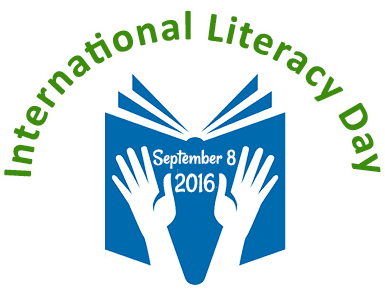This post was written by Environmental Youth Ambassador Abdelhaq Ait Boulhous in honor of International Literacy Day. Happy reading, writing, and learning from our team of young sustainability journalists!
At first
glance, "literacy" would seem to be a term that everyone understands.
But at the same time, literacy as a concept has proved to be both complex and
dynamic, continuing to be interpreted and defined in a multiplicity of ways.
And according to Merriam-Webster website, "Literacy" means to be able
to read and write, and also the knowledge that relates to a specified subject.
Fifty years
ago, UNESCO officially proclaimed 8 September as International Literacy Day to
actively mobilize the international community and to promote literacy as an
instrument to empower individuals, communities and societies.
Learning to
read and write is a fundamental right, protected by international human rights
law. Yet, 38% of African adults are illiterate – and two-thirds of these are
women. Unequal access to education and low literacy means that women have
trouble accessing careers and the public section, making them more likely to
get married at an early age and have few avenues for future independence or
personal growth. This, in turn, negatively impacts their children – Africa is
the only continent where more than half of parents are not able to help their
children with homework due to their own illiteracy.
 There is a
proverb that says “You educate a boy, you educate a man. You educate a girl,
you educate a generation". Dar Si Hmad, an active NGO in Southwest Morocco
dedicated to sustainable livelihoods and the empowerment of rural communities,
recognizes the importance of literacy. It thus developed programs like the Girls’E-Learning project to help girls from rural villages study and prepare their
exams. The Girls' E-Learning program uses technologies to help girls succeed, have
access to a good education, and improve the region’s high school dropout rate.
Participants have the chance to learn and receive lessons online, improving
their literacy in the formal Arabic and French they will be tested on in exams.
There is a
proverb that says “You educate a boy, you educate a man. You educate a girl,
you educate a generation". Dar Si Hmad, an active NGO in Southwest Morocco
dedicated to sustainable livelihoods and the empowerment of rural communities,
recognizes the importance of literacy. It thus developed programs like the Girls’E-Learning project to help girls from rural villages study and prepare their
exams. The Girls' E-Learning program uses technologies to help girls succeed, have
access to a good education, and improve the region’s high school dropout rate.
Participants have the chance to learn and receive lessons online, improving
their literacy in the formal Arabic and French they will be tested on in exams.
Literacy
for younger children is addressed through our “Water School”, targeted at
primary schools. This program, full of lessons & workshops, makes students
of the future understand their environment as a huge space of many objects. It
modules include animal & plant biology, recycling, pollution, the water cycle,
and sanitation. The program gives Dar Si Hmad the chance to discover and
encourage talented kids who have skills like public speaking, theater, and
painting. In a few months, the Water School Curriculum will be available for
free online, part of the organization’s ongoing attempts to share resources and
ideas.
Older
adults in the bled (Moroccan countryside) are supported through trainings for
women in Aït Baâmrane, Southwest Morocco. These literacy days help women with
basic numeracy and literacy skills, enabling them to use their mobile phones to
text – a much cheaper alternative to phone calls. The women are now exploring
ways to use their enhanced skills for income-generating activities like an
argan co-operative.
Bridging
the urban center of Agadir where Dar Si Hmad’s main offices are and the bled
where much of the programming take place is a new initiative I represent. In
May 2016, Dar Si Hmad launched the Environmental Youth Ambassadors, an
innovative program bringing 7 RISE program participants from different parts of
Morocco to be involved in the NGO’s activities. Our work has focused on media
and environmental literacy, using visual content & online campaigns as a
way to communicate based on events and sensitization.
For all
those who can read this – Happy International Literacy Day! Today, I encourage
you to take the time to improve your own literacy. Those of us who have the
tools to read and write can improve our subject-area literacy about
environmental issues. Take a minute to learn about COP22, the international
climate change negotiations happening in Morocco in November. Or explore and
support our Water School and Women’s Empowerment programs.
And lastly,
here’s to all of the projects around the world working to make sure a greater
number of us can read, write, and enjoy the power of written communication by
this time next year. I am excited by Dar Si Hmad’s work and I hope you’ll join
us in working to improve the lives of our communities, in Morocco and around
the world.






No comments:
Post a Comment